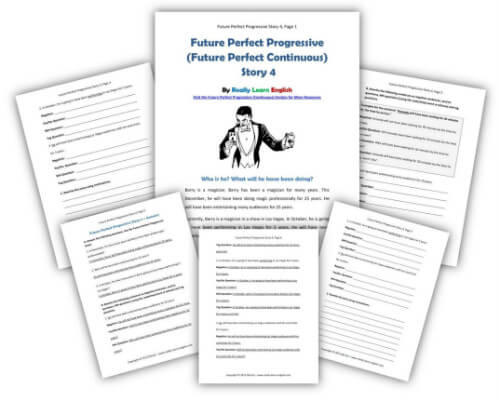



Welcome to the English Grammar Tenses – The Ultimate Resource!
One of the easiest ways to teach and learn grammar is through stories.

Click Here for Step-by-Step Rules, Stories and Exercises to Practice All English Tenses
So we at Really Learn English made this huge collection of stories and exercises available for you, completely free of charge.
You can read the stories online, download the story PDF files, print and use them by yourself or with your students, and check the answers using the answer key.
All we ask in return, is that if you find this resource useful, please link to it and share it with your students, colleagues, and anyone else who may benefit from it. You can link to this page from your website, blog, Facebook, Twitter, LinkedIn, Google+, etc.
Thanks for your support!
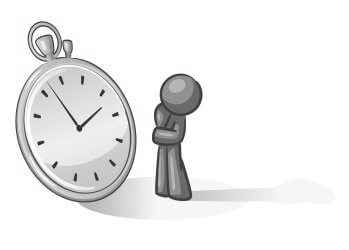
A tense is a form of the verb which shows the time at which an action happens. It comes from the Latin word "tempus", which means "time". Click here for the full article on what tense is.
Please share this page with others:
| Aspect | Time | ||
| Present | Past | Future | |
| Simple | Simple Present | Simple Past | Simple Future |
| Progressive (Continuous) | Present Progressive | Past Progressive | Future Progressive |
| Perfect | Present Perfect | Past Perfect | Future Perfect |
| Progressive + Perfect | Present Perfect Progressive | Past Perfect Progressive | Future Perfect Progressive |
The Simple Present is a form of the verb that shows the action or state happens in the present.
For example: Lisa dances every day.


Hank is a cowboy. He lives on a farm. He has a horse named Ginger. Hank loves Ginger. He rides Ginger every day. Sometimes they walk slowly, and sometimes they run fast. They always have a good time.
Ginger is Hank's horse. She is light brown. Her tail and mane are dark brown. She is three years old. She lives in the stable by the house.
Ginger waits for Hank every morning. She enjoys their time together. Often, Hank gives her apples. After long rides, Hank always washes and brushes Ginger. He usually brushes her tail. Then he gives her food and fresh water. Ginger loves Hank.


Stacy is a singer. She loves to sing. She is in a band. She sings in the band. She is the lead singer. Sometimes she plays the piano.
Chad is Stacy's boyfriend. He is also in the band. He stands next to Stacy. He plays the electric guitar. Sometimes Chad sings with Stacy.
Dean is Chad and Stacy's friend. He is also in the band. He stands next to Chad. He plays bass guitar. Dean does not sing. He does not like to sing.
The band practices three times a week. They mostly perform at nightclubs. Sometimes they sing at weddings. They are a very good band.


Jim Sullivan likes music. He plays many instruments. He plays the piano, clarinet, saxophone, trumpet, guitar, and bagpipes. The bagpipes are his favorite instrument to play. Not very many people play the bagpipes.
Jim plays the bagpipes for celebrations. He also plays the bagpipes in parades. The audience listens to the bagpipes. They clap for Jim. They enjoy the music of the bagpipes.
Jim also teaches people how to play the bagpipes. He gives lessons to children and adults. He teaches them the history of the bagpipes. He teaches them how to play music with the bagpipes. Jim is a good teacher.


Robert Hughes lives in Atlanta, Georgia. He lives with his wife, Patricia. They live with their two children, Sam and Lana. Robert loves his family.
Robert works as a police officer in Atlanta. He likes his job. He is a good police officer. Robert is a police officer because he likes to help people.
Robert protects the citizens of Atlanta. He solves crimes and catches criminals. He keeps the citizens safe.
Sometimes he visits the schools. He talks to students. The students like Robert. Officer Robert Hughes is a hero in Atlanta.
The Present Progressive (Continuous) is a form of the verb that shows the action or state is in progress (continues) in the present.
For example: Lisa is dancing right now.

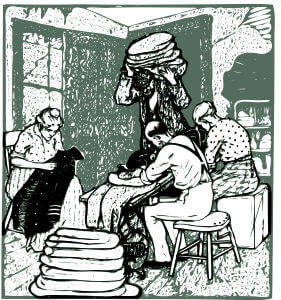
Now Janet is in her house. She is sitting on a wooden chair. She is holding a coat. She is fixing it.
James is Janet's husband. He is sitting in front of her. He is fixing clothes too.
Elizabeth is sitting next to James. She is Janet's sister. Right now she is helping Janet and James. They are working together. They are fixing clothes.
At this moment a man is coming in. He is wearing dark clothes. He is carrying a pile of clothes. They are all working very hard.

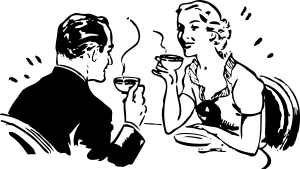
Right now, it is Monday morning. Mike and Tina are at home. They are sitting at a table. They are eating breakfast.
At this moment, Tina is drinking coffee. She is eating a pastry. She is sitting across the table from Mike. She is talking to Mike.
Mike is Tina's husband. He is sitting at the table with Tina. He is also drinking coffee. Mike is listening to Tina.
After breakfast, Mike and Tina are leaving for work. They work in the city. They are riding the bus to work.


Now the children are at school. Amy is sewing. She is practicing. She is sitting on a bench. She is sitting near Timmy.
Timmy is at school too. Timmy is studying. He is sitting behind his desk. He wishes he could play with the other children.
John and Susan are also at school. They are playing outside. They are picking flowers for their teacher. John is carrying his hat. Susan is wearing a bonnet.
At this moment, Sarah is walking by the door. She is helping the teacher. She is carrying textbooks to the shelf.


Today, Abby is visiting her grandparents. She loves her grandparents. At this moment, she is sitting on her grandfather's knee. She is listening to a story. She is smiling. She loves her grandfather's stories.
Jacob is Abby's grandfather. He loves his granddaughter. Right now, he is telling her a story. He is holding her on his knee. He is holding her hands. They are sitting in the living room.
Sarah is Abby's grandmother. At this moment, Sarah is standing in the kitchen. She is baking cookies for Jacob and Abby. She is also listening to Jacob's story.
The Present Perfect is a form of the verb that shows the action or state was complete before the present.
For example: Lisa has danced already.


Linda has just walked outside with Grandmother. She wears an apron. So far, she has finished cleaning and washing. She has also gathered seeds and crumbs. Now Linda and Grandmother are outside. Linda has just dropped some seeds on the ground to feed the birds. The birds have not come yet. Recently, Grandmother has moved in with Linda's family. She now enjoys living with them. Grandmother has already sat down on the bench. She also wears an apron. She has just finished cooking.


Recently, it has snowed in Maria's town. In the last week, it has snowed three times. Maria has always loved the snow. She has played in the snow many times before.
Maria's dog, Sparky, has never played in the snow. This is Sparky's first snow. He has not felt the cold yet.
Maria has just received a new sled for Christmas. She puts on her warm clothes and snow boots. She pulls the sled up the hill. Sparky has run outside with Maria. Sparky has followed Maria up the hill. He feels good!
Maria has finally reached the top. She sits on her sled. She rides down the hill. Sparky runs beside the sled. They have finally reached the bottom. Sparky has followed Maria all the way down the hill. Sparky has decided that he likes the snow too!


Roger and Melinda have owned their sailboat for 10 years. During that time, they have sailed together many times. They have sailed to lots of places.
They have sailed on the Pacific Ocean. They have also sailed on the Atlantic Ocean. They have even sailed around the Gulf of Mexico twice. However, they have never sailed on the Arctic Ocean or Indian Ocean.
In the last year, Roger and Melinda have sailed around the Hawaiian Islands and across the Hudson Bay. Roger and Melinda love to travel in their sailboat!


Mable Jones lives in Florida in the United States. Her grandchildren live in London, England. They have lived in London for 3 years. Mable has not seen her grandchildren in over a year.
She has talked to her grandchildren on the phone and through e-mails many times. She has also seen pictures of her grandchildren. They have grown so much since the last time they visited America.
Mable knits scarves and blankets to send to her grandchildren in London. So far, she has knitted two large blankets for her granddaughters. She has also knitted a scarf for each grandchild.
The Present Perfect Progressive (Continuous) is a form of the verb that shows the action or state started in the past and continued until the present.
For example: Lisa has been dancing for 3 hours without stopping.


Ruth and Martha are best friends. They have been spending time together since they were young girls. Every morning, they get dressed and walk to the post office together. They have been walking together to the post office every morning for the past 10 years.
Lately, Martha has not been feeling well. Ruth has been walking to the post office alone each morning. Then she visits Martha at home. She has been bringing Martha her mail every morning for 2 weeks. She hopes Martha feels better soon.


Nick has been playing the game of marbles since he was 5 years old. He likes to play marbles. He plays with the other kids. He also teaches other kids how to play the game.
Lately, he has been teaching Brian how to play marbles. He has been teaching Brian all the rules of the game. He has been teaching Brian how to win.
Brian is Nick's friend. Recently, he has been learning to play marbles. He has been wishing to play the game for many years. The past few days, his friend, Nick, has been teaching him how to play marbles. It is a fun game.


Jimmy sings with the boys' choir at his church. Jimmy has a good singing voice. He has been singing since he was very young. He has been singing with the boys' choir for the past 3 years. He likes to sing with the choir.
Lately, the choir has been practicing many new songs. They have been learning songs for their Christmas performance. They have been practicing 2 hours every day for the last 2 weeks. They have been working very hard.


Marcus travels to Los Angeles a lot for work. In fact, he has been traveling to Los Angeles once a month for over a year. Every time he travels to Los Angeles, he stays at the same hotel. He likes the service at this hotel. He has been staying at this hotel at least 5 days every month for over a year.
Marcus's favorite employee at the hotel is Benjamin. Benjamin has been working at this hotel for 2 years. He usually works as a bellhop, but lately he has been training for a new job.
For the past 2 weeks, Benjamin has been training to become the assistant manager of the hotel. Marcus is proud of Benjamin because he knows Benjamin has been working hard the last 2 years.
The Simple Past is a form of the verb that shows the action or state happened in the past.
For example: Lisa danced yesterday.


One autumn evening, Charles and Beth went to the theater. They attended a play. The play started at 7:00. Charles and Beth enjoyed the theater.
After the play, Charles and Beth walked together in the park. They walked beside the lake. The moon was bright. They talked about their future.
When Charles and Beth went home, their children were not asleep. They waited for Charles and Beth to return. They were excited to hear about the theater!
Charles told the children about the play. Then, Beth put the children to bed. Charles and Beth were very tired. It was a good night!


Last week, Beth baked a cake for Lilly's birthday party. Lilly wanted a strawberry cake with pink frosting. Beth was happy to bake the cake.
First, Beth mixed the ingredients in a big bowl. Next, she poured the cake batter into four round baking pans. She put the pans in the oven. Finally, she baked the cakes for 20 minutes.
Then, Beth prepared the pink frosting. After the cakes cooled, Beth stacked them and covered them with frosting. Beth wrote Lilly's name on top with white frosting. She put seven candles in the cake.
On Sunday, Beth surprised Lilly with the strawberry cake. Lilly loved her cake! Lilly had many gifts for her birthday. But Lilly said her cake was the best gift of them all!

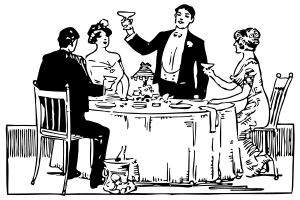
Last night, George was at a restaurant with Clara, Charlie, and Katherine. After dinner, George announced his engagement to Clara. George stood next to Clara. He raised his glass. He announced the engagement to his friends. He looked very happy!
Clara was also at the restaurant. She sat at the table next to George. She smiled when he announced the engagement. She showed her friends her ring. It was very beautiful. Clara also looked very happy!
Charlie and Katherine also sat at the table. They were excited for their friends. Charlie congratulated George and Clara. He shook George's hand. Katherine looked at Clara's ring. She hugged Clara. She was happy for George and Clara!


On Saturday, the Jenson family shopped for a Christmas tree. They got in the car. They drove to the tree farm. Mr. and Mrs. Jenson walked around the tree farm with their kids.
The Jenson family looked at all the trees. They looked at tall trees and short trees. They looked at fat trees and skinny trees. They looked at every tree on the farm. They wanted the perfect tree.
The Jenson kids finally found the perfect tree. It wasn't too tall or too short. It wasn't too fat or too skinny. The tree was exactly what they wanted. It was the perfect Christmas tree!
The Past Progressive (Continuous) is a form of the verb that shows the action or state was in progress (continued) in the past.
For example: Lisa was dancing yesterday at 8 o'clock.


Yesterday, it was raining and thundering all day. Ann was playing inside the house. She wanted to be outside. She wasn't playing outside because it was raining. She was feeling tired of being trapped inside the house.
Ann was trying to keep busy inside the house. She was reading her book until the electricity went out. Then, she decided to practice her sewing. She was practicing sewing until lunchtime. After lunch, she sat by the window and watched the rain.
While Ann was watching the rain, the phone rang. Her mother was calling to say she was coming home. She was bringing a new game. Ann and her mother ate ice cream and played the game.
While they were playing, the rain stopped! But Ann didn't even notice. She was having such a good time with her mom!


One sunny day, Billy and Timmy were delivering a box to Mr. Thompson. The crate was full of glasses. They were carrying the box on a cart. They were taking the glasses to Mr. Thompson's store at the end of the street. They were being very careful with the crate full of glasses.
As they were passing by the school, they saw Jack and Tom. Jack and Tom were playing soccer. Billy and Timmy asked the other boys for help. The four boys steered the cart through the streets. While Billy and Timmy were pulling from the front, Jack and Tom were pushing from behind.
As they were walking, Billy and Timmy were guiding the cart over bumps and holes. They were protecting the glasses. When the four boys arrived at the store, Mr. Thompson was waiting for them. While Mr. Thompson was unloading the glasses, he thanked the boys for their hard work. None of the glasses were broken! The boys were feeling very proud of their hard work.


Last night at 7 o'clock, Nate was taking pictures of birds. He was walking through the city park when he saw a fire. An old, empty building near the park was on fire. Nate pulled out his camera.
He was taking pictures of the fire when the fire trucks pulled up. The firefighters jumped out. They hooked up their hoses. While they were fighting the fire, Nate was taking more pictures.
The firefighters were fighting the fire and Nate was taking pictures when the rain started. The rain helped put the fire out. The firefighters were clapping and Nate was cheering. The fire was finally out.


Mitch was always driving his motorcycle too fast. Yesterday after work, Mitch was driving his motorcycle home. While everyone else was driving slowly, he was speeding through the streets. He wasn't paying attention and was driving too fast when he saw the police officer.
While the police officer was directing traffic, he saw Mitch speeding down the street. He was waving his arms when Mitch stopped. The police officer wrote him a traffic ticket for speeding. Mitch was not feeling happy when he arrived home.
The Past Perfect is a form of the verb that shows the action or state was complete before some time in the past.
For example: Lisa had danced before she came.

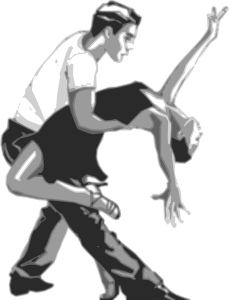
Last night, Dane and Emily danced in a competition. They danced a salsa dance. They had practiced for 6 months before they danced in the competition. They were very good.
Dane and Emily's friends were in the audience. Before that night, they had never seen Dane and Emily dance. In fact, Dane and Emily had never danced in front of anyone before the competition.
After everyone had danced, the judges announced the winners. Dane and Emily won! They were the best dancers in the competition. Emily said she had never practiced so hard before! She was glad they had practiced a lot.


Last weekend, Mark and Trisha went on a date. Mark took Trisha to the golf course. Mark loved to golf. He had learned to golf as a child. He had even played on a team in high school.
Before that day, Trisha had never golfed. She did not know how to hold the golf club. She did not know the rules.
Mark taught Trisha how to play. After Trisha had learned the basics, she hit the ball. It was a good hit! Mark had taught Trisha well.


I had never seen such beautiful sights before I visited Paris in 2012. I had saved money for 5 years before I booked my trip to Paris. I was very excited! Before my trip to Paris, I had never been out of the United States.
When I went to Paris, I spent many days touring the city. The city was big. Sometimes I got lost and asked for directions. I asked for directions in French. That was easy because I had studied French for 2 years before I visited Paris.
By the time I left Paris, I had toured many beautiful places. The Eiffel Tower, Notre Dame Cathedral, and Luxembourg Gardens were just a few of the places I saw. Before I visited Paris, I had only seen those places on television.


The Smith family had never owned a car until they bought their first automobile in 1906. Before they bought it, they had only used horses and a buggy for transportation. They had never owned anything so expensive before they bought the car.
The Smith family was very excited about their automobile. The children had never ridden in an automobile before their parents purchased the car. They had only seen a few automobiles when they went to town for supplies. But nobody they knew had ever owned an automobile before that day. They felt very lucky.
The Past Perfect Progressive (Continuous) is a form of the verb that shows the action or state started in the past and continued until some point in the past.
For example: Lisa had been dancing for 2 hours before she got tired.


Donald and Elizabeth had been driving to church before they stopped. They had been driving down a dirt road when they heard a strange noise. Donald stopped the car. He got out of the car. Then, he helped Elizabeth out of the car. Elizabeth sat and waited for Donald.
Donald looked at the car. It had been going for an hour or so. He knew how to fix cars. He had been working as a mechanic for 5 years before he moved to the country. Donald got his tools. He looked under the hood. It seemed that the engine had been heating up. He crawled under the car.
Donald had been working on the car for a while when Jake parked beside him. Jake had been driving home when he saw Donald and Elizabeth on the side of the road. Jake helped Donald fix the car. Donald thanked Jake for his help. Elizabeth waved to Jake as they drove away. Thanks to Jake's help, they arrived at church on time.


Billy and the other scouts had been hiking on the mountain all morning when they realized they were lost. They looked each direction. They did not see the camp. They did not see the river.
The scouts were tired because they had been hiking for four hours. They were worried because they were lost. They sat down under a tree.
But Billy was not worried. Billy had been hiking these mountains with his dad his whole life. Billy's dad had been teaching him how to use a compass for three years. Billy climbed a tree and saw the river. He knew the camp was north of the river. Billy looked at his compass. He guided the scouts back to the camp.


Lisa slept because she had been feeling very sick. In fact, Lisa had not been feeling well for three days. Her mother knew something was strange because Lisa had not been acting normal. She had not been finishing her meals for the past two days. She had not even been playing with her friends.
The doctor visited Lisa. He had been visiting many children since the sickness arrived. He examined Lisa. He gave Lisa medicine. He talked to Lisa's mother.
Lisa's mother had been praying for a week when Lisa woke up. Lisa looked much better. She did not feel sick anymore. Everyone was happy that Lisa was better!


Patrick had been playing the banjo for about 15 years. Many years ago, his grandfather played the banjo in a band. He taught Patrick how to play the banjo when Patrick was just 10 years old. Patrick had been practicing the banjo ever since. He had been playing for his friends and family for many years.
Last night, Patrick played his banjo on a television show. He had been hoping to be on this show since he first saw it on television 5 years ago. He played in front of a live studio audience. The audience cheered and clapped for Patrick.
Patrick knew he was good because he had been playing the banjo for a long time. Now everyone knew that Patrick was a good banjo player.
The Simple Future is a form of the verb that shows the action or state will happen in the future.
For example: Lisa will dance tomorrow.


On Saturday, Katie will be one year old. Katie's parents are going to have a birthday party. The party is going to begin at noon on Saturday. Many people will be at the party. Katie will have so much fun!
Katie's dad is going to cook hamburgers. Katie's grandmother is going to bring ice cream. Katie's aunt is going to bake a cake. It will be a chocolate cake. Katie will love her cake!
All of Katie's relatives will bring presents. Katie is going to open her presents after lunch. Then, everyone will eat cake and ice cream. Katie is going to have a good first birthday!


This weekend, Erica is going to compete in a tennis tournament. She will practice hard all week because she wants to win the tournament. The winner will receive $1,000. Erica hopes she will get first place!
Erica's husband is going to travel to the tournament with Erica. He will watch her compete. He will sit in the stands and cheer for Erica. He is going to be proud of Erica even if she does not win first place.
Erica's parents are not going to travel to the tournament. They will watch the tournament on television. They will cheer for Erica at home. They are going to be proud of Erica whether she wins or loses.


Brent is an American astronaut. Today, he will travel into outer space. At noon, his space shuttle is going to launch into space. Brent and the other astronauts are going to travel to the International Space Station. They will stay in space for almost 6 months.
The crew is going to continue research at the space station. They will do some experiments. They will record their data. They are also going to make some repairs on the space station.
Brent will learn a lot in space. He is going to make videos of his time on the space station. His family will watch the videos on the internet. They will see what Brent is doing in space.


There is going to be a wedding today. At 4 o'clock this afternoon, Megan Smith and Mark Jones are going to get married. After today, they will be Mr. and Mrs. Mark Jones.
It is going to be a huge celebration. Everyone will be there! They are going to serve dinner and dessert. The best man will give a speech. Then everyone will dance. The dance will last until midnight.
The day after the wedding, Megan and Mark are going to leave for their honeymoon. They are going to travel to Hawaii. They are going to stay there for 7 days. They will have a good time in Hawaii!
The Future Progressive (Continuous) is a form of the verb that shows the action or state will be in progress at some time in the future.
For example: Lisa will be dancing tomorrow at 8 o'clock.


Brad likes to fish. He fishes whenever he can. This weekend, he will be fishing at the lake. It is his favorite place to fish.
Mark is Brad's friend. Mark likes to fish too. He also fishes whenever he can. This weekend he will be fishing at the lake with Brad. They will be camping at the lake all weekend.
Mark will be picking Brad up at 8 o'clock Friday night. Brad will be ready when Mark arrives. They will be driving all night before they get to the lake.
They are excited about the weekend. Brad and Mark both love to fish. They love to fish together. They will be fishing together for many years!


Today, there is going to be a parade. At the beginning of the parade, the mayor is going to be driving by in his carriage. The horse will be pulling the carriage and the mayor will be waving to the crowd. The crowd will be waving when the mayor passes by.
Timothy and his grandfather will be standing in front of the store when the mayor passes them. Timothy and his grandfather are going to be watching and waving. Everyone is going to be having a good time at the parade.


Sir Thomas is going to be arriving at 3 o'clock today. When Sir Thomas arrives, the servants will be waiting. Young Charlie will also be waiting at the door.
When Sir Thomas walks into the house, most of the servants are going to be bowing. One servant will be parking the car. Others are going to be preparing dinner. Charlie is going to be carrying Sir Thomas's suitcase into the house.


Tomorrow afternoon, the ship will be sailing to Antarctica. The sailors are going to be working very hard when the ship sails. Some sailors will be pulling ropes on the sails. Others are going to be watching for icebergs. The captain is going to be navigating the ship while it is sailing.
When the ship arrives at its destination, some sailors are going to be resting. Others will be making repairs to the ship. The captain is going to be exploring the land. His assistant will be drawing a map of the land.
The Future Perfect is a form of the verb that shows the action or state will be complete before some time in the future.
For example: Lisa will have danced by 9 o'clock.


Mr. Jones is a farmer. He owns a big farm. He plants crops in his fields in the spring. By the time he finishes planting this spring, he will have planted 10 acres of crops. He is going to have planted many crops.
Mr. Jones must finish planting before it starts to rain. He is working hard. At this rate, he will have finished planting before it rains. Mr. Jones and his horse will have worked many long hours by the time they finish tonight.


Tyler and William are paddling their canoe down the river. They are traveling a long distance through trees and canyons. They will have paddled for many miles by the time they arrive at their destination. They are going to have been gone for 2 weeks by the time they finish their trip.
They are going to have seen many sights by the time their trip is completed. They probably will have seen many wild animals. They will have eaten many fish. They will not have seen many other people by the end of their trip.


Brett is in the army. Tomorrow, he will leave home to join his troops overseas for 18 months. He will have trained for 8 months by the time he leaves. He will have worked very hard by the time he comes home.
By the time he returns, he is going to have been gone for 18 months. His wife will have worried about him all that time. They will have written many letters by the time he comes home. She will be happy when he returns safely.


John works in an automobile factory. He works on the assembly line assembling cars. He works many hours every day. By the time he finishes working today, he is going to have worked 10 hours. He will have assembled over 50 cars.
Chris also works on the assembly line in the automobile factory. In December, he will have worked there for 5 years. By the time he finishes working today, he is going to have worked over 8 hours. He will have assembled about 40 cars today.
The Future Perfect Progressive (Continuous) is a form of the verb that shows the action or state will continue until some point in the future.
For example: By tomorrow morning, Lisa will have been dancing for 12 hours.


Paul and Lindsey are going on a sleigh ride to their friend's house for the weekend. The snow will be deep, but their horse is very strong. They are going to travel a long way. They will have been riding in the sleigh for over an hour by the time they arrive.
Paul's horse, Midnight, will pull the sleigh over the snow. When they arrive, Midnight will be tired because he is going to have been pulling the sleigh for over an hour. Midnight will need food and rest because he will have been pulling the sleigh over all that snow.


Pete is a window washer. Today, he is going to be washing windows on the 13th floor of a downtown office building. He will have been washing windows for almost 10 hours when he finishes all of the windows on the 13th floor. He will be very tired tonight because he will have been working so hard.
Although the work is difficult, Pete enjoys his job. In August, he will have been working as a window washer for 5 years. He will have been washing windows in this city for the past 5 years.


Everyone is at church. They are listening to the minister. By the time the minister finishes his sermon, the people will have been listening to him preach for over an hour. They will have been sitting on the hard pews for over an hour.
The minister is giving the sermon. It is a long sermon. He will have been talking for over an hour by the time he finishes. He will have been standing behind the pulpit for over an hour.


Barry is a magician. Barry has been a magician for many years. This December, he will have been doing magic professionally for 25 years. He will have been entertaining audiences for 25 years.
Currently, Barry is a magician in a show in Las Vegas. In October, he is going to have been performing in Las Vegas for 3 years. He will have been entertaining Las Vegas audiences with his card tricks for 3 years.
For many more examples of the English tenses visit this section:
Examples of English Tenses

By submitting your email, you consent to receiving updates and newsletters from us and to the sharing of your personal data with third parties for the purposes of sending you communications. We will not spam you. You can unsubscribe at any time. For more information, please see our privacy policy.